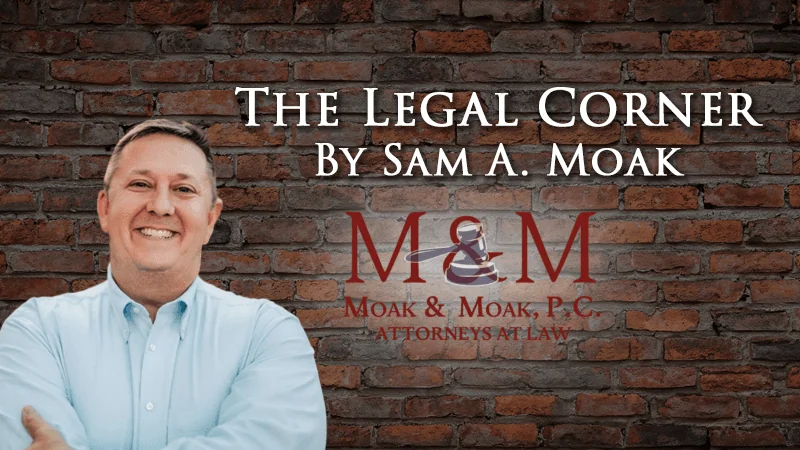The information in this column is not intended as legal advice but to provide a general understanding of the law. Any readers with a legal problem, including those whose questions are addressed here, should consult an attorney for advice on their particular circumstances.
My youngest son is attending Texas A&M University and a member of the Corps of Cadets. Due to his commitment to Texas A&M, he will not be able to come home and vote on Election Day. So, he filed out paperwork to mail in his ballet. I am proud that he values the importance of voting. My parents, O.J. and Paula Moak, made voting fun. We used to “compete” to see who could vote first and have bragging rights. Mom and I had many conversations about candidates and issues on the ballet.
Beginning the week of October 21, 2024, you can vote early for the November general election. The poles will be open from 8 am to 5 pm October 21 through the 25th and then open 7 am to 7 pm October 26 through November 1, 2024. The general election will be held on Tuesday, November 5, 2024. Our state and local elections are also very important, and it is our right to choose our leaders.
I have discussed voting with many people, and I am always amazed at how many people do not take advantage of their right to vote. Considering the extreme sacrifices our ancestors endured to obtain and protect this right, it baffles me that voter turnout is so low.
To underline the importance of voting, this week, I thought I would provide some of the most famous events in the voting history of the United States.
- The passage of the U.S. Constitution in 1787 gave white male property owners aged 21 and over the right to vote.
- A series of acts from 1807 through 1843 changed voting requirements so that all white men 21 and older could vote.
- The 15th Amendment, passed in 1870, guaranteed the right to vote to all men who were 21 or older, regardless of race or ethnic background.
- The 19th Amendment, passed in 1920, gave women age 21 and older the right to vote.
- The 24th Amendment, passed in 1964, made it illegal for states to charge poll tax to voters.
- The Voting Rights Act authorized the federal government to take over the registration of voters in areas where state officials had regularly prevented blacks and other minorities from registering to vote or cast their ballots through the usage of literacy tests, grandfather clauses, and intimidation tactics. This Act enforced provisions previously guaranteed in the 13th, 14th, and 15th Amendments of almost a century earlier.
- The 26th Amendment, passed in 1971, lowered the voting age across the nation to 18.
- The Voting Rights Act Amendments of 1982 extended right-to-vote guarantees given in the 1965 legislation. Further provisions for Americans with disabilities, voters not able to read and write, and those not fluent in English were added to ensure their freedoms.
- The National Voter Registration Act (Motor Voter) of 1993 expanded the opportunity for convenient voter registration for every person of voting age by increasing the number of active government agencies serving as registries. The Department of Safety, Health, Human Services, Mental Health and Retardation, and Veteran's Affairs are required to include voter registration applications with their own department's forms. Other government offices such as libraries, post offices, county clerk offices, and the Registrar of Deeds will also have voter forms available to the public.
According to a study done by Dr. Michael McDonald, Department of Public and International Affairs at George Mason University, on voter turnout, 28% of the eligible voters in Texas actually voted in our 2008 Presidential Primary. This was up from 2000 (11%) and 2004 (15%). However, I still feel this low turnout is very sad.
Many times I am given the excuse “one vote does not matter.” So I thought I would provide you with some examples of where one vote did matter.
- In 1645, one vote gave Oliver Cromwell control of England.
- In 1776, one vote gave America the English language instead of German.
- In 1868, one vote saved President Andrew Jackson from impeachment.
- In 1875, One vote changed France from a monarchy to a republic.
- In 1876, one vote gave Rutherford B. Hayes the Presidency of the United States of America.
- In 1923, one vote gave Adolf Hitler leadership of the Nazi Party.
- In 1941, one vote saved the Selective Service - just weeks before Pearl Harbor was attacked.
- In 1990, one vote decided a state House race in Oakland County, Michigan.
- In 2008 the first African American was elected President of the United States.
- In 2016, in what many thought was an upset, Donald J. Trump was elected President of the United States.
In his Gettysburg Address, Abraham Lincoln said: “It is rather for us to be here dedicated to the great task remaining before us -- that from these honored dead we take increased devotion to that cause for which they gave the last full measure of devotion -- that we here highly resolve that these dead shall not have died in vain -- that this nation, under God, shall have a new birth of freedom -- and that government of the people, by the people, for the people, shall not perish from the earth.”
Diana McRae, Walker County Elections Officer, was gracious enough to provide me with information for this column. She has great information on the Walker County website at www.co.walker.tx.us. Just click on the “CURRENT ELECTIONS” tab. Sample ballots, voting places, and more information can be found there. You can also call her office if you prefer at (936)436-4959. Another great source for information, per Diana, is VoterTexas.gov. This is provided by the Secretary of State.
I challenge you in the next 2 weeks, or certainly Tuesday, November 5th, to take advantage of your right to vote. No matter who your personal choice is, the key is that you exercise this right paid for so dearly by our ancestors. So, exercise your constitutional right, VOTE! I bet I beat you to the polls.
Sam A. Moak is an attorney with the Huntsville law firm of Moak & Moak, P.C. He is licensed to practice in all fields of law by the Supreme Court of Texas, is a Member of the State Bar College, and is a member of the Real Estate, Probate and Trust Law Section of the State Bar of Texas. www.moakandmoak.com


